Europe Is on Her Own, Is the Message of the G20
Adelina Marini, November 4, 2011
 "I do not know how you are all feeling today [November 3] but I suspect that your mood more or less matches the weather in Cannes today: on the one hand, it is warm but at the same time it is raining, and there is a sense that things are not going as well as they could". This is what the President of Russia, Dmitry Medvedev, said in his speech at a business forum in Cannes, preceding the G20 summit - the twenty most influential economies in the world. Quite expectedly, his speech was entirely focused on the problems stemming from the dynamically unfolding crisis in Europe.
"I do not know how you are all feeling today [November 3] but I suspect that your mood more or less matches the weather in Cannes today: on the one hand, it is warm but at the same time it is raining, and there is a sense that things are not going as well as they could". This is what the President of Russia, Dmitry Medvedev, said in his speech at a business forum in Cannes, preceding the G20 summit - the twenty most influential economies in the world. Quite expectedly, his speech was entirely focused on the problems stemming from the dynamically unfolding crisis in Europe.
Sunny, but windy with thunders
This was the weather in Cannes yesterday, November 3, when the situation caused by Greece was changing like a summer storm - from sunny and nice to strong thunders and dark clouds with showers. The leaders of the 20 most influential countries in the world (Argentina, Australia, Brazil, India, Indonesia, China, South Africa, Mexico, Turkey, Japan, the US, Canada, South Korea, Saudi Arabia, Russia, the EU, France, Germany, Britain, Italy) started arriving yet on November 2 in the evening because of the stalemate, created after Greek PM Georgios Papandreou's  bluff that he would subject to a referendum the painfully agreed, precisely for the G20 summit, rescue package for the eurozone.
bluff that he would subject to a referendum the painfully agreed, precisely for the G20 summit, rescue package for the eurozone.
Yet in the evening an urgent meeting was called for the euro area representatives with the Greek prime minister, and on Thursday in the day the situation in Greece, which was evolving from a resignation of the government to a back-off from the referendum, caused urgent bilateral talks with the Italian premier Silvio Berlusconi too.
 The result from all this is the main message from the talks - you are on your own. As Mr Medvedev explained to the business leaders, the European economy is too big to be saved from the outside. He said that Russia was ready to take part in the programmes for financial support of the EU member states but through the instruments of the International Monetary Fund. But "the actions of the European governments take on a central role because the ability of the recent decisions to ensure the full stabilisation of the European economy depends entirely on them. Naturally", he went on, "everyone is waiting for good news from Greece: good, but not exotic or populist. I hope that we will not have to wait too long".
The result from all this is the main message from the talks - you are on your own. As Mr Medvedev explained to the business leaders, the European economy is too big to be saved from the outside. He said that Russia was ready to take part in the programmes for financial support of the EU member states but through the instruments of the International Monetary Fund. But "the actions of the European governments take on a central role because the ability of the recent decisions to ensure the full stabilisation of the European economy depends entirely on them. Naturally", he went on, "everyone is waiting for good news from Greece: good, but not exotic or populist. I hope that we will not have to wait too long".
Later, before journalists, Dmitry Medvedev said that everything was circling around the eurozone crisis and "and Greece’s extravagant position, which has changed several times over the course of the day".
The New York Times wrote, quoting unnamed sources from the American team, that the US was also expecting Europe to use its own resources to solve the crisis, instead of seeking help from China. "Look, we went through this ourselves [the 2008 crisis]. They have the capacity to handle this within Europe", the sources is quoted as saying.
In the margins of the G20 another important meeting took place - of the BRICS 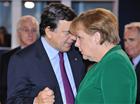 countries (Brazil, Russia, India, China and South Africa), considered the most dynamically developing countries in the world. Dmitry Medvedev announced at a joint news conference with his Chinese counterpart Hu Jintao, that the main topic of the meeting was the euro area crisis and possible help from these countries. According to Russian journalists, concrete sum was even discussed with which Russia could contribute, something around 10bn euros. But Mr Medvedev said that it was too early to talk about concrete numbers because specific details were needed on how the proposed on October 27 mechanisms for fund-raising would function through the rescue fund EFSF.
countries (Brazil, Russia, India, China and South Africa), considered the most dynamically developing countries in the world. Dmitry Medvedev announced at a joint news conference with his Chinese counterpart Hu Jintao, that the main topic of the meeting was the euro area crisis and possible help from these countries. According to Russian journalists, concrete sum was even discussed with which Russia could contribute, something around 10bn euros. But Mr Medvedev said that it was too early to talk about concrete numbers because specific details were needed on how the proposed on October 27 mechanisms for fund-raising would function through the rescue fund EFSF.
Dmitry Medvedev added that the talks with the BRICS countries were initial consultations. "It is in everyone’s interests to maintain the Euro: in the interests not just of the Europeans, but also the Russian Federation and China too. We should think about what we are doing though, act consciously, aware of the risks that exist. We must make sure that this aid is targeted, clear and transparent, and not some hasty attempt that will end up seeing the funds spread too thin among who knows how many recipients. We have to have a clear understanding of the conditions under which this aid will be provided", the Russian head of state added.
At a news conference before the working dinner last night, the host, French President Nicolas Sarkozy, also acknowledged that the main topic of the first day of the summit in Cannes was the eurozone. According to him, though, Europe demonstrated its will to apply as fast as possible the agreements on the rescue fund. Without elaborating Mr Sarkozy announced that there were partners who expressed readiness to help the euro area and sent message of confidence. Regarding Greece the French leader said that such a solution was needed that would be clear speaking, open-minded but firm: "the euro brings with it obligations … there is solidarity as long as everyone sticks to the rules".
 On the other very much discussed topic - Italy - the French president again expressed confidence in the Italian economy. He made this also during the marathon of European councils and eurozone summits in Brussels the week before. He added that he worked together with the Italian authorities for closer surveillance over the implementation of the agreed package for the reduction of the country's debt, surpassing 120% of GDP. Obviously the confidence Mr Sarkozy is talking about is being expressed just like with Greece by sending eyes, ears and hands in Rome. As it becomes clear Italy has agreed to work with a Troika mission on the implementation of the government programme. Similar surveillance the European
On the other very much discussed topic - Italy - the French president again expressed confidence in the Italian economy. He made this also during the marathon of European councils and eurozone summits in Brussels the week before. He added that he worked together with the Italian authorities for closer surveillance over the implementation of the agreed package for the reduction of the country's debt, surpassing 120% of GDP. Obviously the confidence Mr Sarkozy is talking about is being expressed just like with Greece by sending eyes, ears and hands in Rome. As it becomes clear Italy has agreed to work with a Troika mission on the implementation of the government programme. Similar surveillance the European 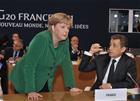 Commission and the IMF exercise on the bailout countries - Greece, Ireland and Portugal.
Commission and the IMF exercise on the bailout countries - Greece, Ireland and Portugal.
The BBC reported that Italy would be included in the official communique from the summit, which was to be agreed during the working lunch today.
Another topic that was discussed on the first day in Cannes was the introduction of a financial transaction tax (FTT). This idea of the French president is already two years old but constantly meets resistance from the rest of the G20 countries, including inside the EU - in the face of financial centres like London and Luxembourg. According to Sarkozy, technically the introduction of such a tax was possible, moreover that it had a moral element in it. "It is clear not everyone agrees on this. We noted with great satisfaction that Brazil and Argentina, their presidents were together in favour of such a tax", the French head of state added.
 Against all this background, the sunny weather came with the analysis on the first day of EU's institutional leaders - Commission President Jose Manuel Barroso and European Council President Herman Van Rompuy. According to them, the advanced economies had to implement their fiscal commitments, made last year at the G20 summits in Toronto and Seoul, because they were still valid. Furthermore, the two leaders returned the ball by saying that they were encouraged by the US's efforts for fiscal consolidation and supported President Obama's administration in implementing the jobs plan. Regarding the emerging markets, Barroso and Van Rompuy paid special attention to China, not missing to recall: "we note their commitments on measures to rebalance their domestic economy in the short term. This should be accompanied by greater exchange rate flexibility".
Against all this background, the sunny weather came with the analysis on the first day of EU's institutional leaders - Commission President Jose Manuel Barroso and European Council President Herman Van Rompuy. According to them, the advanced economies had to implement their fiscal commitments, made last year at the G20 summits in Toronto and Seoul, because they were still valid. Furthermore, the two leaders returned the ball by saying that they were encouraged by the US's efforts for fiscal consolidation and supported President Obama's administration in implementing the jobs plan. Regarding the emerging markets, Barroso and Van Rompuy paid special attention to China, not missing to recall: "we note their commitments on measures to rebalance their domestic economy in the short term. This should be accompanied by greater exchange rate flexibility".
During the working dinner last night David Cameron, Britain's PM, presented a report on global governance. The British premier was asked to prepare the report by Nicolas Sarkozy. In it, quite in the English pragmatic manner, Mr Cameron does not offer any revolutionary ideas but instead wants more effectiveness in using the current structures for global governance. His main recommendations are the G20 to remain an informal global organisation. Still informally a troika of presidencies - past, current and future presidents - to be established, assisted by a small Secretariat of representatives of the G20 countries. This is very similar as a structure to most of the international organisations.
According to Cameron, this will help pursue the G20’s agenda consistently through time. Besides, the G20 leaders have to make the Financial Stability Board an independent legal entity so that it has the identity, authority and capability required to play a fully effective coordination role at the international level. The current president of the Board is the new chief of the European Central Bank, Mario Draghi, who however announced yesterday that he would resign from the post and this would be his last G20 participation in that capacity.
David Cameron also offers the World Trade Organisation to turn into a guardian of the world trade system including enhancing its surveillance to guard against protectionism, refining its dispute settlement mechanisms. As the British prime minister said, "the answer is not to be found in elaborate new institutions and global architecture. We have the machinery that we need already. No – what we need above all is the most precious and intangible commodity – political will. Political will  to act together, and to build the consensus we need to squarely confront the problems before us so that we can return our economies to health and vigour".
to act together, and to build the consensus we need to squarely confront the problems before us so that we can return our economies to health and vigour".
In other words, the result from day one of the summit is, to paraphrase the title of a Bulgarian movie*, salvation is lurks around the corner but the world is indeed very very small for someone to think that is sheltered on his own. For today the weather forecast was cloudy and rainy.
*The name of the movie in English is The World Is Big And Salvation Lurks From Around The Corner
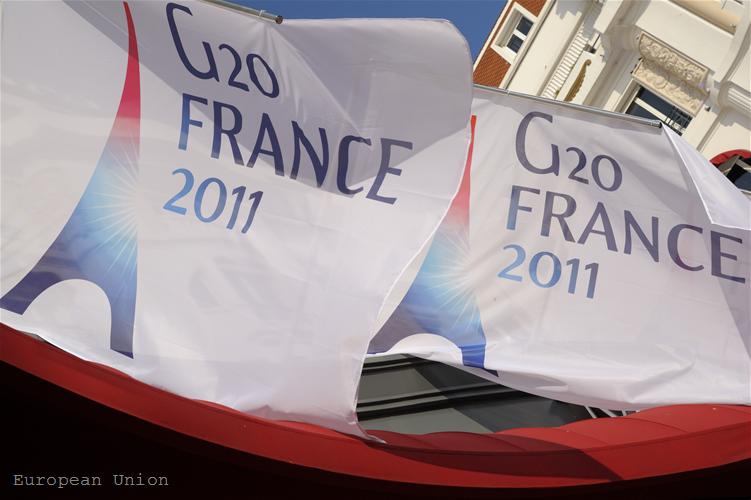 | © European Union
| © European Union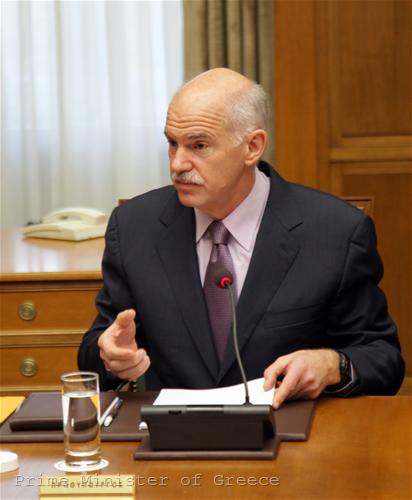 | © Prime Minister of Greece
| © Prime Minister of Greece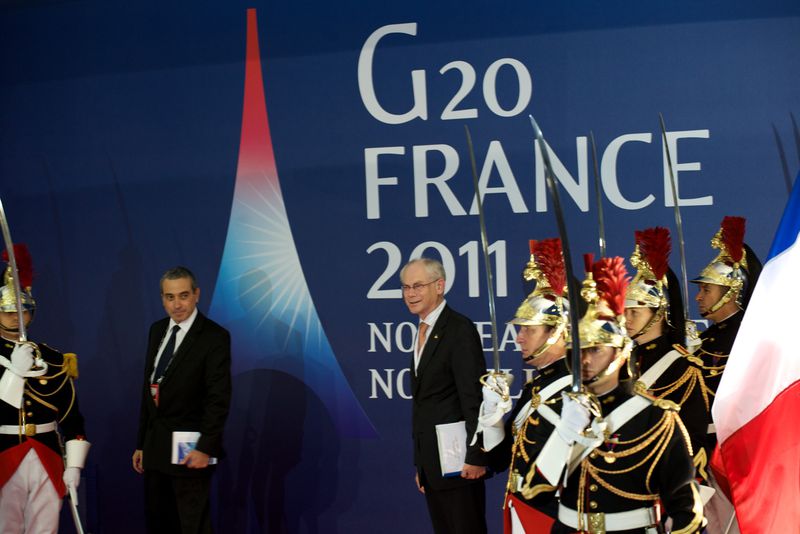 | © European Union
| © European Union